The Rings of Power season 1 ending explained: who is Sauron?
Full spoilers follow for The Rings of Power episode 8 and The Lord of the Rings novels.
The Rings of Power season 1 finale has dropped on Prime Video – and, unsurprisingly, it’s filled with huge and shocking revelatory content.
The high fantasy, big-budget Prime Video series has finally answered some of the biggest questions surrounding some of its characters, the forging of the titular rings, and key Middle-earth lore (as well as some notable revisions to its history and timeline). In fact, there’s so much packed into episode 8 – titled Alloyed – we imagine your head may be in a spin over everything you’ve just learned.
Below, we’ll break down the biggest moments and reveals from The Rings of Power’s eighth episode. We’ll explain who Sauron and The Stranger actually are, which rings have been created, and more about the episode’s most significant talking points.
Major season 1 spoilers, as well as information in The Lord of the Rings Appendices, follow. If you haven’t watched episode 8 yet, turn back now.
The Rings of Power season 1 ending explained: who is Sauron?
Answer: That’ll be Halbrand.
Initially, we thought he was heir to the Southlands’ throne, but it was all a lie. He’s actually the Dark Lord himself, aka Sauron, aka Morgoth’s apprentice, aka Lord of the Rings’ primary antagonist who forges the One Ring.
Fans have long speculated that Sauron was masquerading as Halbrand since we met him in the show’s two-episode premiere, although the show’s cast already knew Charlie Vickers, who portrays Halbrand, was really playing Sauron. Thanks to some tight writing and multiple misdirects on the writers’ room’s part, too, Halbrand had fallen down our list of candidates about who would end up being Sauron.
Now, many of us have egg on our faces – ourselves included. Ahead of Alloyed’s release, we suggested that Halbrand couldn’t be Sauron as he was nowhere near The Mystics, the mysterious trio who have spent the past three episodes searching for Sauron. As we say, it’s a lovely bait and switch on creators J.D. Payne and Patrick McKay’s (and their fellow writers’) part.
So, how did we find out Halbrand is Sauron? More fuel was added to this particular fire when, after arriving at Eregion and recovering a bit too quickly from his wounds, Halbrand meets Celebrimbor and begins to work his magic.

He convinces the elven smith to forge an item – from Elrond’s piece of mithril – of unimaginable power. Initially, it’s going to be a crown that High King Gil-galad will wear. But, when that fails, Halbrand suggests making two rings – i.e. two of the titular Rings of Power – instead. This plays out similar to how Sauron seduces Celebrimbor and the elves in J.R.R. Tolkien’s source material, with one of Sauron’s aliases – Annatar – counselling the elves on the rings’ forging.
Later, when Galadriel requests and receives a scroll about the Southlands’ royal lineage, Halbrand’s name isn’t there. In fact, there’s been no Southlands monarch for 1,000 years. After confronting Halbrand about this, he reveals he’s actually Sauron in disguise. Following a increasingly frenetic verbal back and forth, Sauron uses his abilities to trap Galadriel in a mind prison, tries to drown her after she refuses to join him in reshaping Middle-evil under his tyrannical fist, and makes his escape.
The last shot of season 1 is Halbrand/Sauron smiling as he looks out over Mordor, which he’ll turn into his base of operations. Altogether now: uh-oh…
The Rings of Power season 1 ending explained: why is The Stranger called Istari?
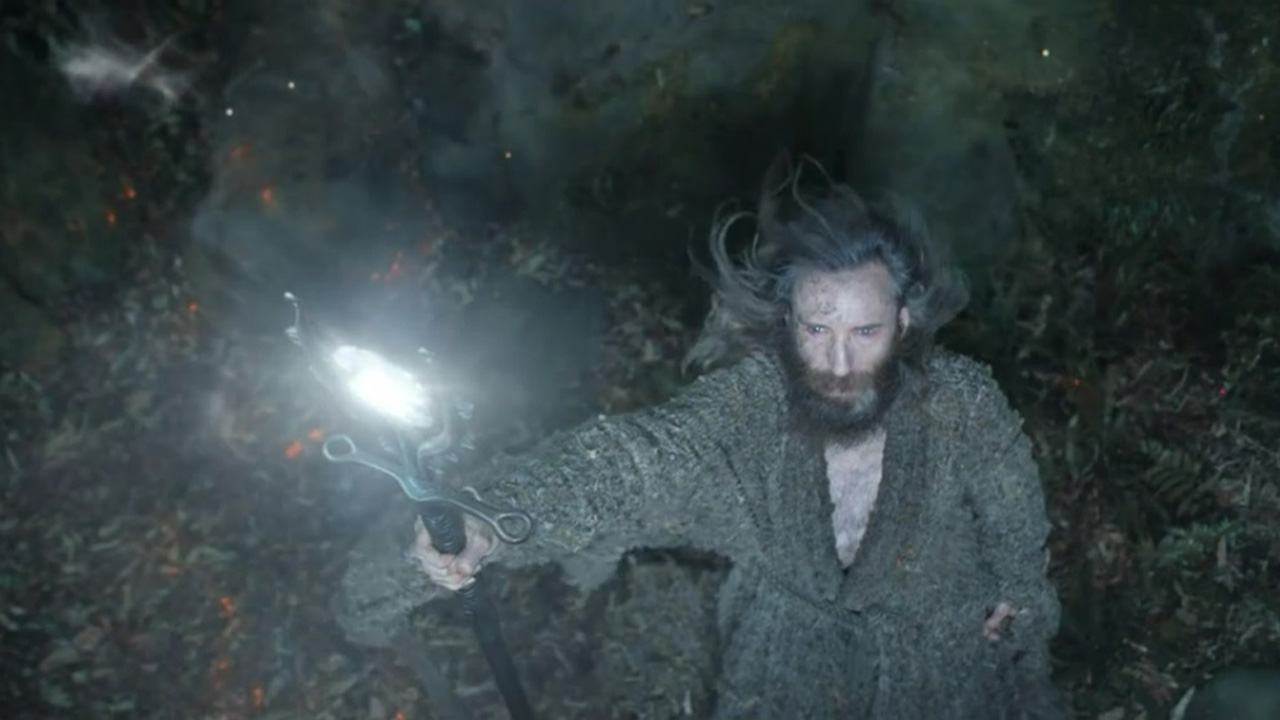
Answer: because that’s the collection of powerful beings he’s belongs to.
Sauron’s reveal aside, The Stranger’s identity was the biggest question fans had going into The Rings of Power’s first season. Unfortunately, we don’t learn what his name is – probably because he doesn’t have one yet or can’t remember the one he was given.
However, what we do know is something that fans had also heavily speculated on since the show’s first trailer dropped in February. And yes, it’s true: The Stranger is a one of the Istari, the five wizards sent by the Valar to aid Middle-earth’s races in the fight against Sauron.
We learn this when The Stranger is battling The Mystics midway through episode 8. The trio, who are about to be destroyed by The Stranger, state that he’s an Istari. Asked by Nori what Istari means later in the episode, The Stranger tells her that it means “wise one. Or, in your tongue, wizard”.
This will be a very contentious issue among diehard Lord of the Rings fans. In the source material, the Istari aren’t sent to Middle-earth until the Third Age. Given that The Rings of Power is set in the Second Age, some Tolkienites will bristle at – nay, be furious with – the series’ revision of this particular piece of Lord of the Rings lore. More casual viewers, though, aren’t likely to be fussed about this historical tweak.
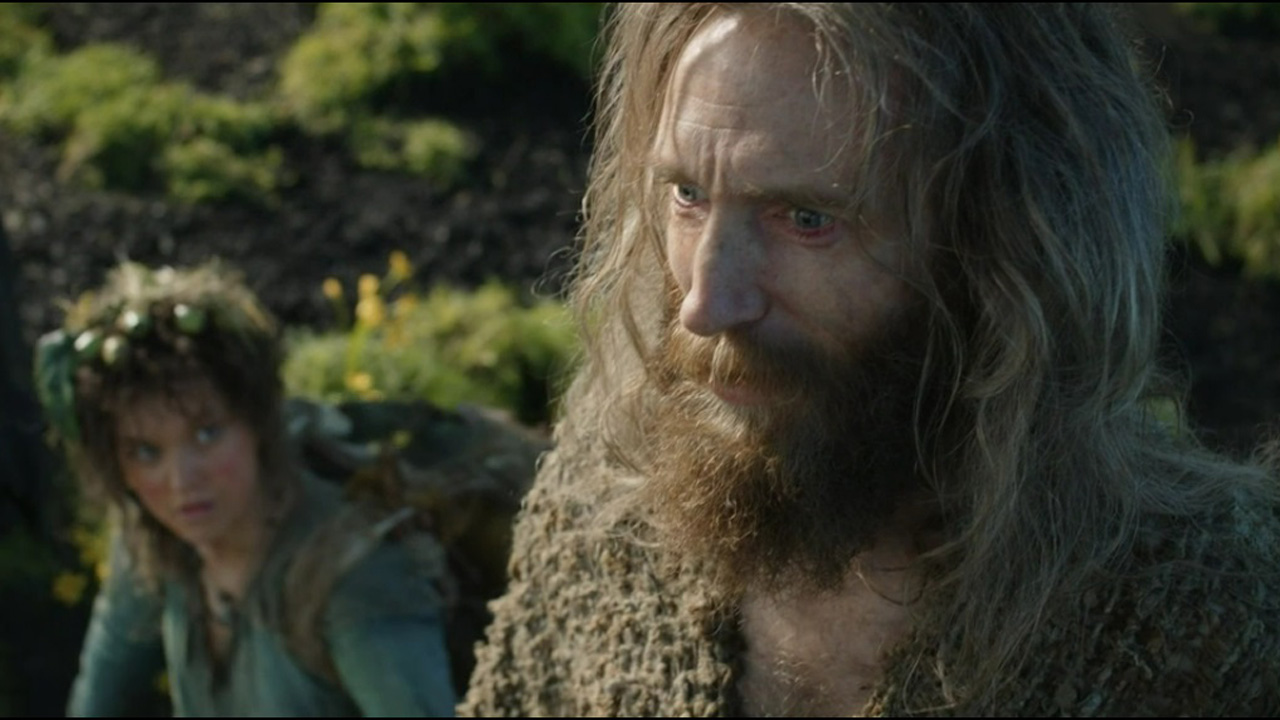
So, the next major question is: which wizard will The Stranger be? The obvious choice is Gandalf. And, based on a classic Gandfal quote he says to Nori before they leave for Rhûn – “When in doubt, always follow your nose” – it seems nailed on that this is who The Stranger is.
That said, it could be another piece of deception on the showrunners’ part. Who’s to say Gandalf doesn’t learn that quote from another wizard?
Subsequently, then, we can’t rule out Saruman. After all, he started out as a force for good until his desire for power corrupts his mind and he turns evil, and Gandalf always seeks his council in times of need. Maybe Saruman is the one who gifts that somewhat wise quote to Gandalf, who goes on to make it his own?
There are three other potential candidates, too. We’ve seen one of those – Radagast the Brown – in Peter Jackson’s Hobbit movie trilogy, but he doesn’t play a big role in The Hobbit or Lord of the Rings novels, nor does he go on big adventures. Radagast tends to spend his days surrounded by animals and concocting healing potions, so The Stranger is unlikely to be him.
While Gandalf is looking like the most obvious choice, we actually think The Stranger is one of the other wizards, whose backstories aren’t even detailed in Tolkien’s source material. To learn more, we need to ask another vital question.
The Rings of Power season 1 ending explained: why are The Stranger and Nori going to Rhûn?
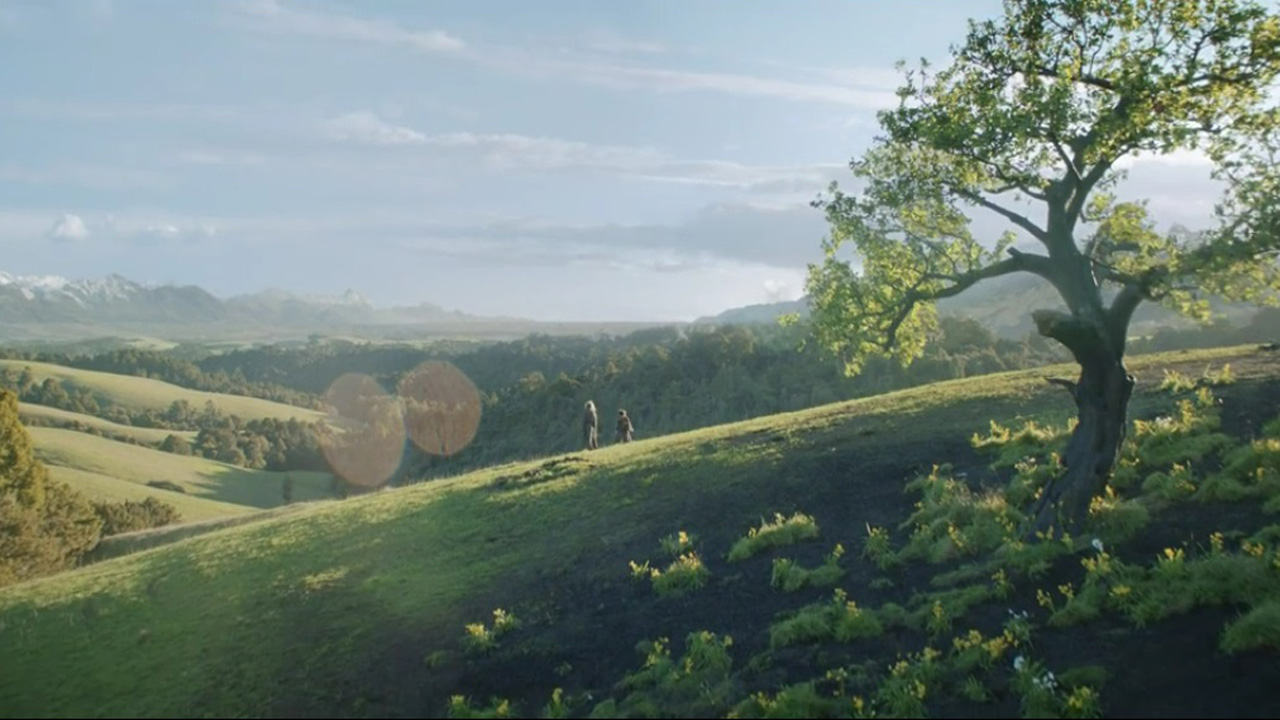
Answer: to find answers about The Stranger’s past and true identity.
Early in episode 8, when The Mystics are convinced The Stranger is Sauron, we learn that one of them – The Nomad – bears a shield with a constellation engraving. That’s the same set of stars on The Stranger’s torn piece of paper, which Nori stole from Sadoc’s Harfoot history tome, to help The Stranger in The Rings of Power episode 3.
With The Mystics hailing from the land of Rhûn, a large region situated in Middle-earth’s far east, it’s not a stretch to suggest that The Stranger will find that constellation – and answers about his identity – there. That’s where he and Nori have set off for in the season 1 finale, though it’s unclear if they’ll actually learn more about The Stranger when they arrive.
Our view? We think The Stranger will find out who he is in Rhûn. Not only that, but we believe he’ll learn he’s one of the Blue Wizards.
Read our Rings of Power recaps
Tolkien’s fleeting notes on the Blue Wizards offer some clues as to why this might be the case. For starters, the two Blue Wizards don’t have non-elvish names in Lord of the Rings’ extensive history. In the language of the Valinor, they’re known as Alatar and Pallando. Among Middle-earth’s races, they’re also called Morinehtar and Rómestámo.
Unlike Gandalf, Saurman, and Radagast, however, the Blue Wizards aren’t given common names. This gives The Rings of Power’s writers’ room the flexibility to create names for the pair if they appear in the show.
While information on the Blue Wizards is scarce in Tolkien’s works, we also know that they traveled far into Middle-earth’s eastern regions – exactly where The Stranger and Nori are heading to in season 2. Who’s to say that the duo won’t run into the other Blue Wizard, join forces with them, and serve the Valar by stopping the Easterlings – a race of Men loyal to Sauron – from bolstering the Dark Lord’s forces?
The only other information we have is that they seemingly served as missionaries or adversaries to enemies in this region. Like their common names, then, the series’ writers have the chance to fill in a large lore-sized hole in Middle-earth’s history and tell us what role the Blue Wizards – whether The Stranger is one or not – had in Rhûn and beyond.
The Rings of Power season 1 ending explained: which rings were forged?
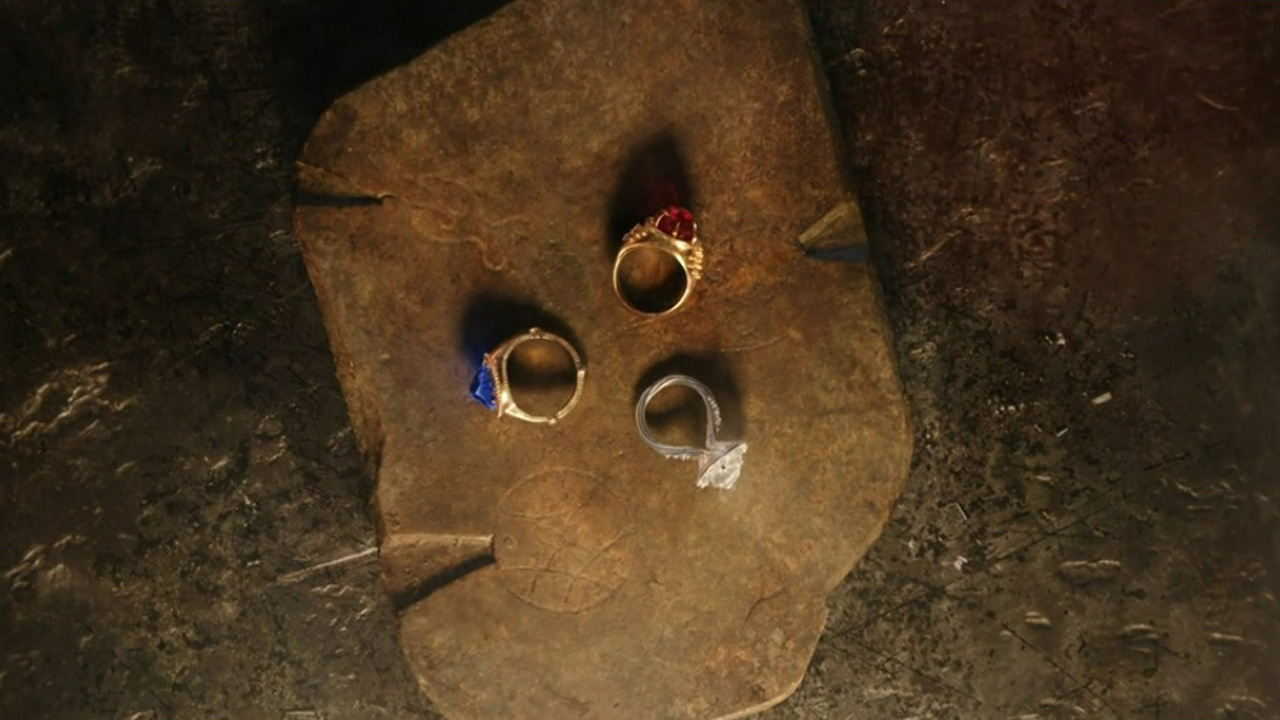
Answer: the three elven rings – Nenya, Narya, and Vilya.
After Halbrand/Sauron nearly kills Galadriel, he mysteriously disappears, leaving Galadriel and Elrond to dissuade Celebrimbor from pressing ahead with his suggestion to make two rings.
Instead, Galadriel proposes that three items should be forged. “One will corrupt and two will divide,” she says, before Celebrimbor clocks on and adds “But three will balance”.
So, three Rings of Power are created – and they just happen to be the three pieces of jewellery that a powerful elven trio wear for the remainder of their time in Middle-earth. Not only that, but their forging is aided by Finrod’s dagger, which comprises Valinor gold and steel to help with the crafting process. A reluctant Galadriel is heistant to part with her brother’s weapon but, to serve the greater good and save the elves from destruction, she agrees to give it up.
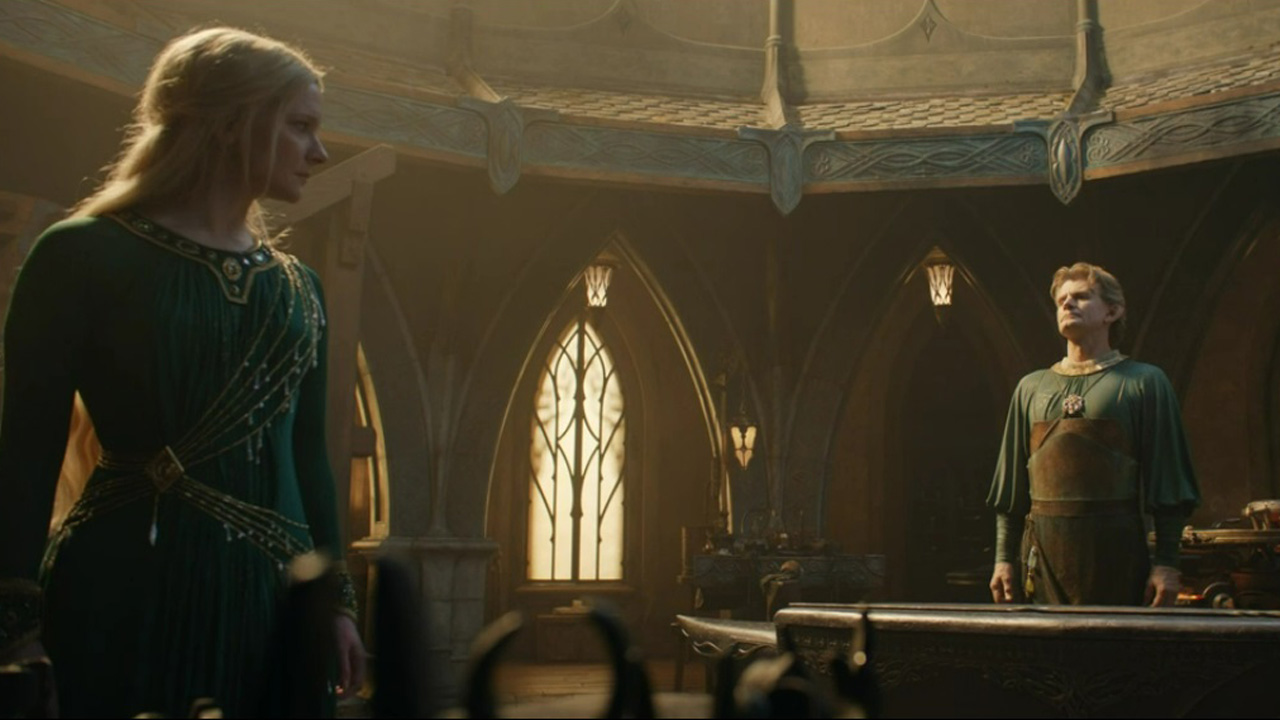
The first ring is called Nenya, the Ring of Adamant and also the Ring of Water. This band is made of mithril – obviously – and comes equipped with a stone of adamant. It’s the ring that Galadriel owns through the Second and Third Ages.
Next, we have Narya, the red Ring or Ring of Fire, which is set with a ruby. Tolkien’s source material doesn’t state that Narya contains mithril but, based on what occurs in the season 1 finale, it must do. Narya ends up being worn by Círdan the Shipwright, one of the oldest elves to live and a character who’ll debut in season 2. Círdan passes Narya onto Gandalf some time later.
Lastly, Vilya, aka the Ring of Air and the Ring of Sapphire, is the mightiest of the three elven rings. It’s a band made of gold with a sapphire set in it, which is gifted to Gil-galad after its creation. Elrond gets the ring after Gil-galad.
What makes the elven rings so important in the battle against Sauron? The Dark Lord had no involvement in their crafting, so these bands are unsullied by his hands. When Sauron eventually creates the One Ring, the elves aren’t corrupted by Sauron, meaning he can’t influence them like he does with the nine kings of men, who turn into the Ringwraiths. Thanks to their rings’ power, though, they realize when Sauron has forged his ring with the aim of enslaving Middle-earth, which sets The War of the Elves and Sauron – a key battle in the Second Age – in motion.
It’s unclear if we’ll see the other 17 rings – the One Ring, the nine for the kings of men, and seven for the dwarf lords – forged in season 2. With Sauron now set to occupy Mordor, you can bet it won’t be long before we do.
The Rings of Power season 1 is available to stream in full now on Prime Video.
For all the latest Technology News Click Here
For the latest news and updates, follow us on Google News.
